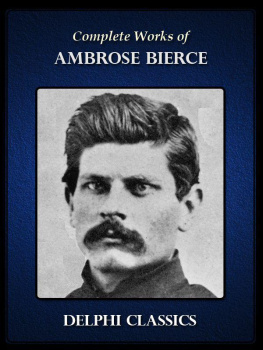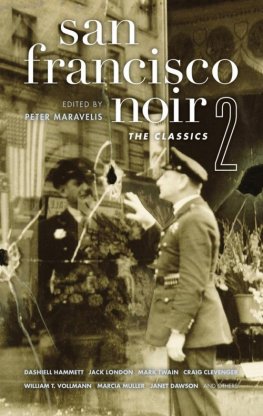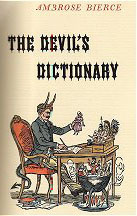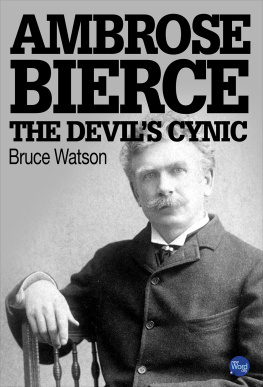Ambrose Bierce - The Shadow On The Dial, and Other Essays
Here you can read online Ambrose Bierce - The Shadow On The Dial, and Other Essays full text of the book (entire story) in english for free. Download pdf and epub, get meaning, cover and reviews about this ebook. genre: Prose / Non-fiction. Description of the work, (preface) as well as reviews are available. Best literature library LitArk.com created for fans of good reading and offers a wide selection of genres:
Romance novel
Science fiction
Adventure
Detective
Science
History
Home and family
Prose
Art
Politics
Computer
Non-fiction
Religion
Business
Children
Humor
Choose a favorite category and find really read worthwhile books. Enjoy immersion in the world of imagination, feel the emotions of the characters or learn something new for yourself, make an fascinating discovery.

- Book:The Shadow On The Dial, and Other Essays
- Author:
- Genre:
- Rating:5 / 5
- Favourites:Add to favourites
- Your mark:
- 100
- 1
- 2
- 3
- 4
- 5
The Shadow On The Dial, and Other Essays: summary, description and annotation
We offer to read an annotation, description, summary or preface (depends on what the author of the book "The Shadow On The Dial, and Other Essays" wrote himself). If you haven't found the necessary information about the book — write in the comments, we will try to find it.
The Shadow On The Dial, and Other Essays — read online for free the complete book (whole text) full work
Below is the text of the book, divided by pages. System saving the place of the last page read, allows you to conveniently read the book "The Shadow On The Dial, and Other Essays" online for free, without having to search again every time where you left off. Put a bookmark, and you can go to the page where you finished reading at any time.
Font size:
Interval:
Bookmark:
THE SHADOW ON THE DIAL
AND OTHER ESSAYS
By Ambrose Bierce
Edited by S. O. HOWES
A NOTE BY THE AUTHOR
IT WAS expected that this book would be included in my "Collected Works" now in course of publication, but unforeseen delay in the date of publication has made this impossible. The selection of its contents was not made by me, but the choice has my approval and the publication my authority.
AMBROSE BIERCE.
Washington, D. C. March 14. 1909.
PREFACE
THE note of prophecy! It sounds sharp and clear in many a vibrant line, in many a sonorous sentence of the essays herein collected for the first time. Written for various Californian journals and periodicals and extending over a period of more than a quarter of a century, these opinions and reflections express the refined judgment of one who has seen, not as through a glass darkly, the trend of events. And having seen the portentous effigy that we are making of the Liberty our fathers created, he has written of it in English that is the despair of those who, thinking less clearly, escape not the pitfalls of diffuseness and obscurity. For Mr. Bierce, as did Flaubert, holds that the right word is necessary for the conveyance of the right thought and his sense of word values rarely betrays him into error. But with an oddI might almost say perverseindifference to his own reputation, he has allowed these writings to lie fallow in the old files of papers, while others, possessing the knack of publicity, years later tilled the soil with some degree of success. President Hadley, of Yale University, before the Candlelight Club of Denver, January 8, 1900, advanced, as novel and original, ostracism as an effective punishment of social highwaymen. This address attracted widespread attention, and though Professor Hadley's remedy has not been generally adopted it is regarded as his own. Mr. Bierce wrote in "The Examiner," January 20, 1895, as follows: "We are plundered because we have no particular aversion to plunderers."
The 'predatory rich' (to use Mr. Stead's felicitous term) put their hands into our pockets because they know that, virtually, none of us will refuse to take their hands in our own afterwards, in friendly salutation. If notorious rascality entailed social outlawry the only rascals would be those properlyand proudlybelonging to the 'criminal class.'
Again, Edwin Markham has attracted to himself no little attention by advocating the application of the Golden Rule in temporal affairs as a cure for evils arising from industrial discontent In this he, too, has been anticipated. Mr. Bierce, writing in "The Examiner," March 25, 1894, said: "When a people would avert want and strife, or having them, would restore plenty and peace, this noble commandment offers the only meansall other plans for safety and relief are as vain as dreams, and as empty as the crooning of fools. And, behold, here it is: 'All things whatsoever ye would that men should do to you, do ye even so to them.'"
Rev. Charles M. Sheldon created a nine days' wonder, or rather a seven, by conducting for a week a newspaper as he conceived Christ would have done. Some years previously, June 28, 1896, to be exact, the author of these essays wrote: "That is my ultimate and determining test of right'What, under the circumstances, would Christ have done?'the Christ of the New Testament, not the Christ of the commentators, theologians, priests and parsons."
I am sure that Mr. Bierce does not begrudge any of these gentlemen the acclaim they have received by enunciating his ideas, and I mention the instances here merely to forestall the filing of any other claim to priority.
The essays cover a wide range of subjects, embracing among other things government, dreams, writers of dialect, and dogs, and always the author's point of view is fresh, original and non-Philistine. Whether one cares to agree with him or not, one will find vast entertainment in his wit that illuminates with lightning flashes all he touches. Other qualities I forbear allusion to, having already encroached too much upon the time of the reader.
S. O. HOWES.
THE SHADOW ON THE DIAL
I.
THERE is a deal of confusion and uncertainty in the use of the words "Socialist," "Anarchist," and "Nihilist." Even the '1st himself commonly knows with as little accuracy what he is as the rest of us know why he is. The Socialist believes that most human affairs should be regulated and managed by the Statethe Governmentthat is to say, the majority. Our own system has many Socialistic features and the trend of republican government is all that way. The Anarchist is the kind of lunatic who believes that all crime is the effect of laws forbidding itas the pig that breaks into the kitchen garden is created by the dog that chews its ear! The Anarchist favors abolition of all law and frequently belongs to an organization that secures his allegiance by solemn oaths and dreadful penalties. "Nihilism" is a name given by Turgenieff to the general body of Russian discontent which finds expression in antagonizing authority and killing authorities. Constructive politics would seem, as yet, to be a cut above the Nihilist's intelligence; he is essentially a destructionary. He is so diligently engaged in unweeding the soil that he has not given a thought to what he will grow there. Nihilism may be described as a policy of assassination tempered by reflections upon Siberia. American sympathy with it is the offspring of an unholy union between the tongue of a liar and the ear of a dupe.
Upon examination it will be seen that political dissent, when it takes any form more coherent than the mere brute dissatisfaction of a mind that does not know what it wants to want, finds expression in one of but two waysin Socialism or in Anarchism. Whatever methods one may think will best substitute for a system gradually evolved from our needs and our natures a system existing only in the minds of dreamers, one is bound to choose between these two dreams. Yet such is the intellectual delinquency of many who most strenuously denounce the system that we have that we not infrequently find the same man advocating in one breath, Socialism, in the next, Anarchism. Indeed, few of these sons of darkness know that even as coherent dreams the two are incompatible. With Anarchy triumphant the Socialist would be a thousand years further from realization of his hope than he is today. Set up Socialism on a Monday and on Tuesday the country would be en fte, gaily hunting down Anarchists. There would be little difficulty in trailing them, for they have not so much sense as a deer, which, running down the wind, sends its tell-tale fragrance on before.
Socialism and Anarchism are the two extremes of political thought; they are parts of the same dung, in the sense that the terminal points of a road are parts of the same road. Between them, about midway, lies the system that we have the happiness to endure. It is a "blend" of Socialism and Anarchism in about equal parts: all that is not one is the other. Everything serving the common interest, or looking to the welfare of the whole people, is socialistic in the strictest sense of the word as understood by the Socialist Whatever tends to private advantage or advances an individual or class interest at the expense of a public one, is anarchistic. Cooperation is Socialism; competition is Anarchism. Competition carried to its logical conclusion (which only cooperation prevents or can prevent) would leave no law in force no property possible no life secure.
Of course the words "cooperation" and "competition" are not here used in a merely industrial and commercial sense; they are intended to cover the whole field of human activity. Two voices singing a duetthat is cooperationSocialism. Two voices singing each a different tune and trying to drown each otherthat is competitionAnarchism: each is a law unto itselfthat is to say, it is lawless. Everything that ought to be done the Socialist hopes to do by associated endeavor, as an army wins battles; Anarchism is socialistic in its means only: by cooperation it tries to render cooperation impossiblecombines to kill combination. Its method says to its purpose: "Thou fool!"
Font size:
Interval:
Bookmark:
Similar books «The Shadow On The Dial, and Other Essays»
Look at similar books to The Shadow On The Dial, and Other Essays. We have selected literature similar in name and meaning in the hope of providing readers with more options to find new, interesting, not yet read works.
Discussion, reviews of the book The Shadow On The Dial, and Other Essays and just readers' own opinions. Leave your comments, write what you think about the work, its meaning or the main characters. Specify what exactly you liked and what you didn't like, and why you think so.








